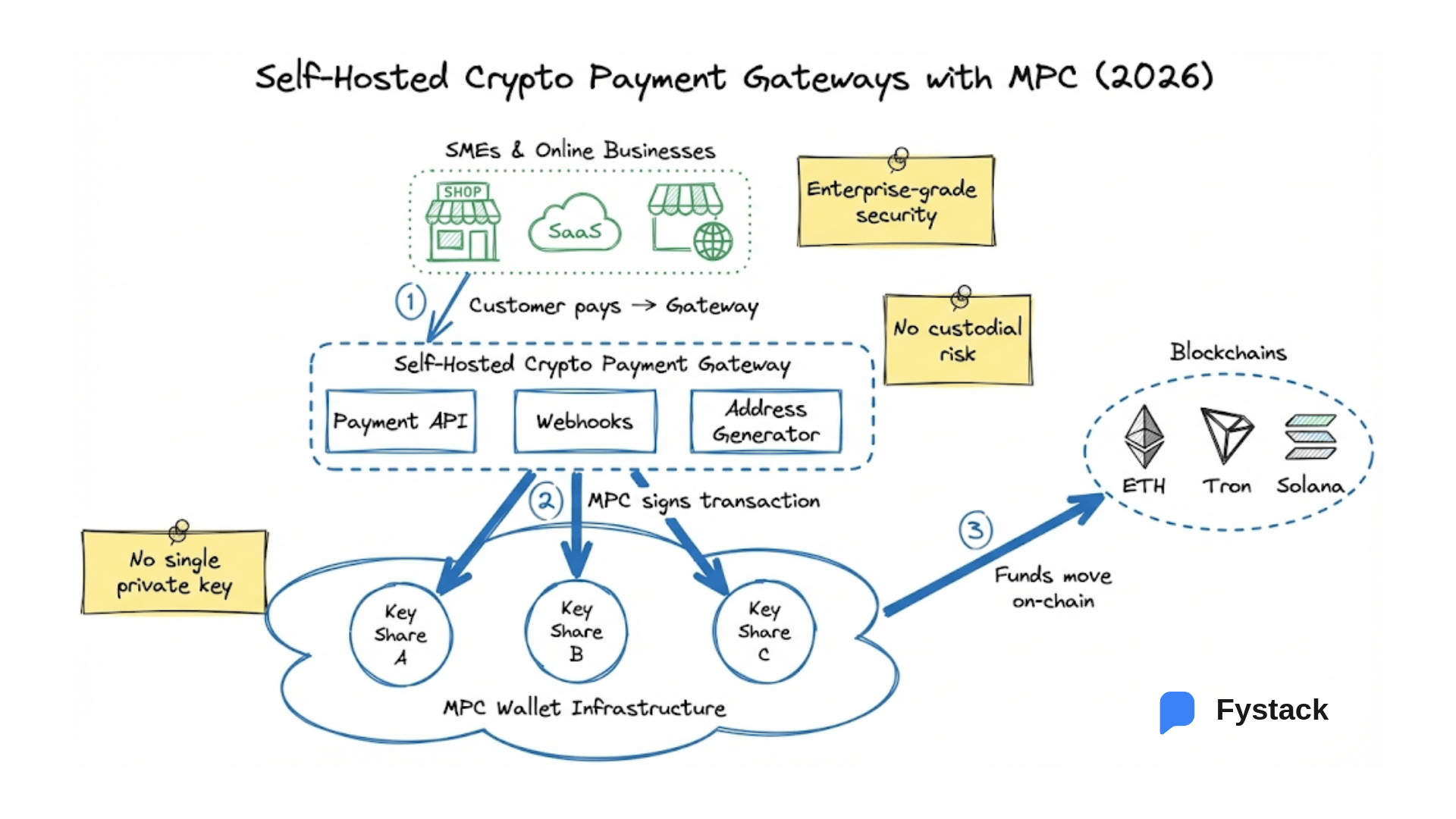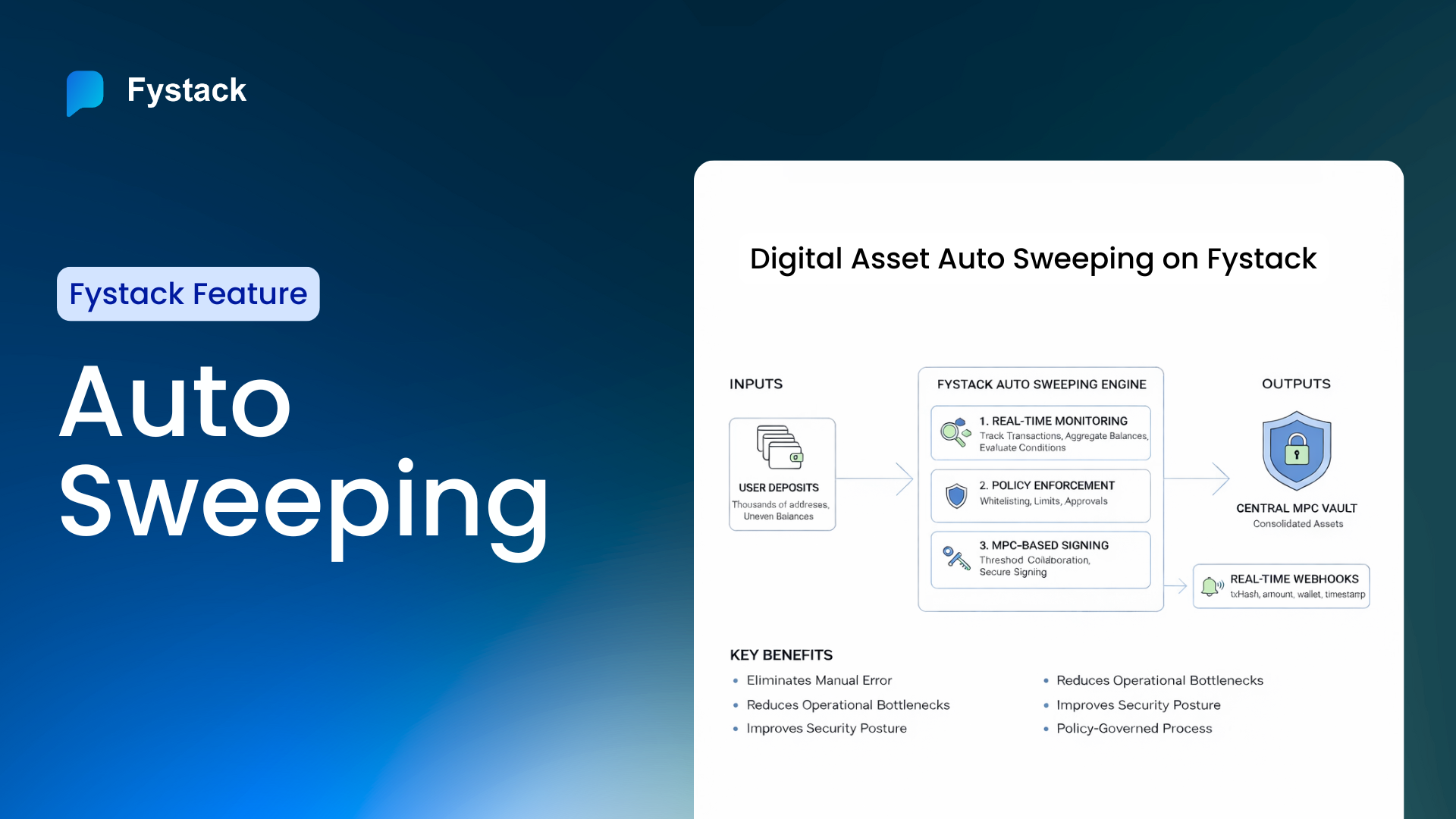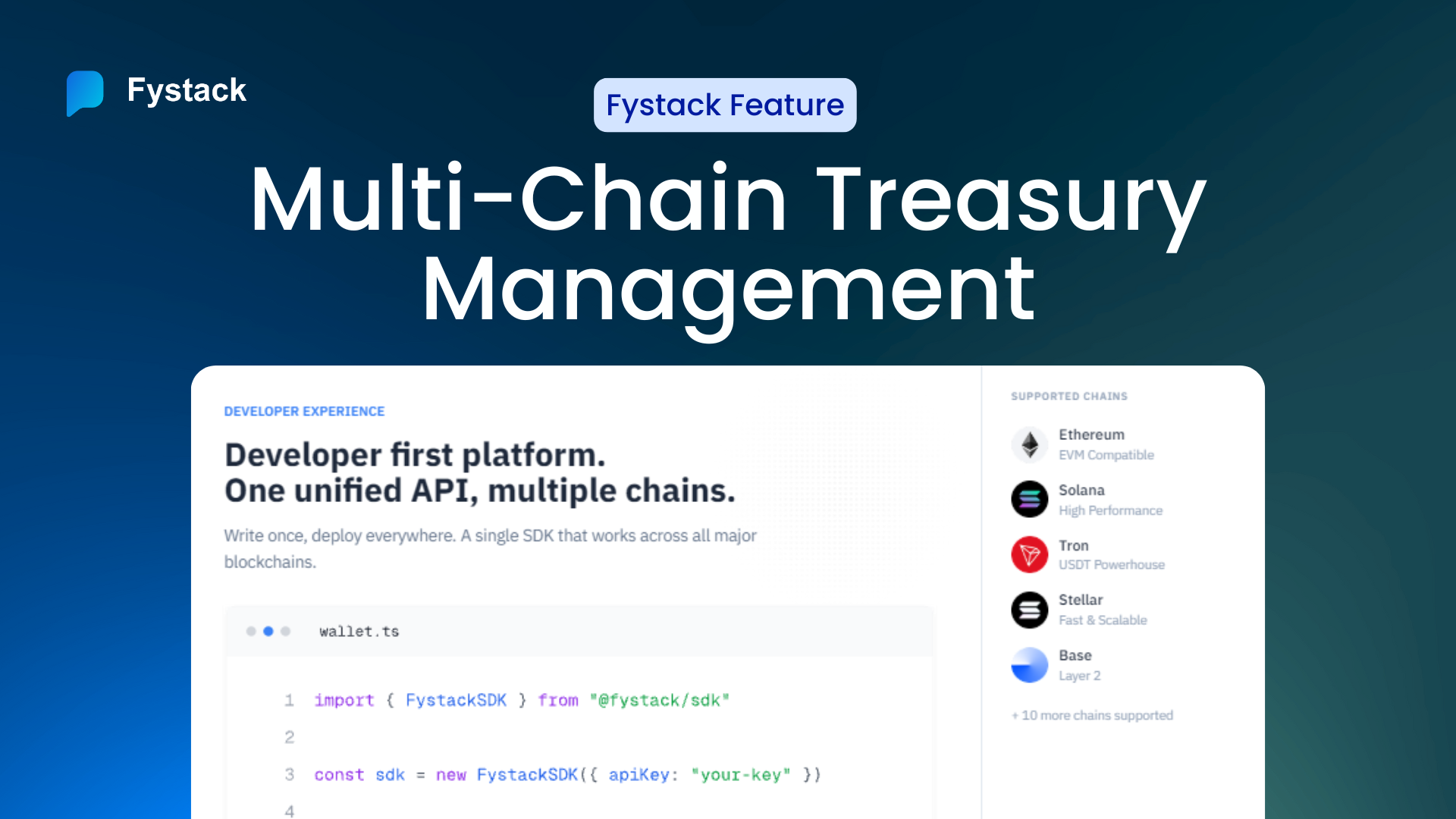Why Fintech Companies Should Choose MPC Wallets to Go On-Chain
Thi Nguyen
Author
Founder

The Pain of Going On-Chain
For traditional companies moving into blockchain, crypto, and stablecoins, the shift from Web2 to Web3 sounds exciting but the first encounter with blockchain infrastructure often feels like stepping into chaos.
The questions start piling up immediately:
- Which wallet do we use for a team? MetaMask was built for individuals, not organizations.
- Which chains should we integrate? Ethereum? Solana? Layer-2s? New L1s launching every quarter?
- How do we manage private keys? A seed phrase in a password manager? A hardware wallet in someone’s desk? Who keeps the private keys: CEO, CTO, CFO?
- What about compliance? Navigating 2025 Crypto Regulatory Compliance for Web3 & Fintech Startups is complex. If we serve EU customers, do key shares need to stay in the EU?
- Why move on-chain? For many, understanding Why Fintech Companies Should Choose MPC Wallets to Go On-Chain is the first step before touching any infrastructure
The reality is: wallets are the foundation, and without the right approach, everything else built on top is fragile.
The Core Problem With Wallets in Crypto
In crypto, one truth never changes: if you lose your private key, you lose your assets. That’s why key management is the foundation of crypto security.
Digital assets (BTC, ETH, stablecoins, tokenized assets) are bearer instruments: whoever controls the private key controls the asset. Once lost or stolen, there’s no recovery.
In 2024, crypto theft reached $2.2B (up ~21% YoY), and just the first half of 2025 already surpassed $3.1B. The majority of these losses came from poor wallet security and private key compromise.

Why Traditional Wallets Don’t Work for Businesses
Most popular wallets were built for individuals, not teams or companies:
- Self-custodial browser/mobile based wallets MetaMask & Trust Wallet
- Designed for retail users.
- One device, one seed phrase.
- No built-in access control, approvals, or team workflows.
- Easy for a single employee to misplace or misuse.
- Ledger & Other Hardware Wallets
- Strong offline security.
- But impractical for businesses that need frequent, automated transactions.
- Difficult to scale across multiple employees, offices, or regions.
- Multi-Signature Wallets (Multisig)
- Closer to what businesses need (M-of-N approvals).
- But multisig is chain-specific, expensive in gas on some networks, and hard to update (e.g., rotating signers).
- Limited flexibility for compliance or custom rules.
For fintechs or Web2 companies looking to go on-chain, these wallets create operational risk: too centralized, too rigid, or too limited.
That is why modern businesses are moving away from simple Multisig setups and looking for the Top Non-Custodial Solutions for Stablecoin Businesses (2025 Edition) to ensure scalability and security.
The Rise of MPC Wallets

MPC Wallets have become the Critical Infrastructure for Enterprise-Grade Web3 Security. MPC changes the game by splitting the private key into shares held across devices, servers, or even geographies. The full key never exists in one place.
This brings three huge advantages:
- No single point of failure, one hacked device can’t drain the wallet.
- Team workflows built-in, approvals, roles, and recovery can be enforced cryptographically.
- Chain-agnostic, one MPC wallet can work across multiple blockchains.
At Fystack we split the private key into multiple shares and store on different cloud providers to ensure maximum security for our users.

How MPC Works?
MPC, or Multi-Party Computation, is a cryptographic technique that allows multiple parties to compute something together without revealing their individual inputs to each other or reconstructing the full key in one place.
It's like solving a puzzle together, but each person holds a piece that no one else can see, and no one needs to reveal their piece to complete the picture.
This means:
- There is no full private key to steal.
- Compromise of one device doesn’t expose the wallet.
- Security and control can be distributed across geographies, devices, or teams.
Who’s Already Using MPC?
- Binance Web3 Wallet: Seedless recovery, no seed phrases, integrated directly into the Binance app.
- OKX Keyless Wallet: Implements 2-of-3 MPC with shares across device + server + iCloud/Google Drive. Two shares are required to sign, making it both secure and recoverable.
- Coinbase Wallet-as-a-Service (WaaS): Coinbase does not use MPC in its consumer-facing Coinbase Wallet app, but its Wallet-as-a-Service platform for developers (launched in 2022) uses MPC under the hood.
- Zengo: Consumer wallet that eliminates passwords/seeds, relies on biometric login.
- Bitcoin.com Wallet (2025): Recently adopted MPC for smoother onboarding of retail users.
The Hidden Trade-Off: Security vs Usability
Here’s what most teams don’t realize:
- Developing an MPC wallet for your team is extremely hard. The protocols are complex, vendors are expensive, and open-source libraries take months to productionize.
- Most companies either fall back to unsafe hacks, or get locked into overpriced custody providers that don’t scale. (See our analysis: Fystack vs. Fireblocks: What is the Future of Crypto Asset Custody?).
This complexity is why we built tools to simplify the process. Developers can now even Self-Host a Full-Fledged Custody Platform with One Command Line using Fystack Ignite, bypassing months of R&D.
This is why the “million questions” problem exists, fintech founders want to go on-chain, but every choice (wallet, chain, key management, compliance) feels like a trap.
Fystack: Web3 With a Web2 Experience
This is the exact gap Fystack is closing.
- Balance security and usability: MPC wallets without the weeks of setup or millions in vendor fees.
- Web3 in a Web2 style: APIs, dashboards, and policies that feel familiar to fintech engineers. Think “set up like Stripe,” not “read a cryptography paper.”
- Multi-chain by design: Instead of asking “which chain do we integrate?”, Fystack makes wallets work across Ethereum, Solana, Layer-2s, and more.
- Compliance-aware: Key shares can be pinned to specific regions or infrastructure.
The result: teams don’t need to answer a million blockchain questions before building. They can onboard to Web3 with the same confidence they onboarded to AWS or a payment processor.
Why This Matters
For fintechs exploring tokenization, stablecoins, or digital asset payments:
- MetaMask isn’t enough.
- Ledger won’t scale.
- Multisig is so complex,
MPC is the way forward proven by both retail adoption (Binance, OKX, Coinbase, Zengo) and institutional custody (banks and custodians).
The opportunity now lies in the middle: businesses who want to go on-chain but need wallet infrastructure that feels as easy as Web2.
That’s the gap Fystack is solving.
Fystack builds wallets that are secure and abstract away the complexity of both chain integration and wallet infrastructure, enabling Web2 companies to explore Web3 safely without needing in-house blockchain expertise. We’ve designed features Web2 teams already expect user management, control policies, audit trails, webhooks, and developer-friendly APIs so your team can integrate digital assets directly into existing workflows.
Sign up at fystack.io to create your first secure MPC wallet.



